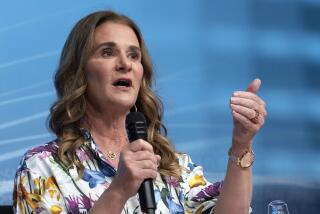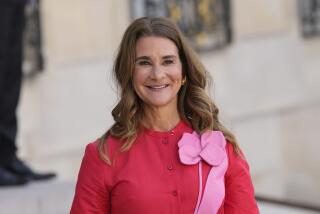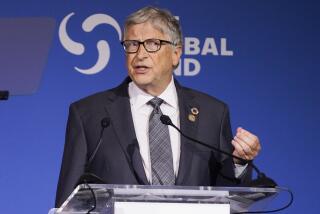Gates Foundation pledges $500 million to help the poor save money
- Share via
Reporting from Seattle — The Bill & Melinda Gates Foundation pledged $500 million Tuesday to help create new banking systems that will reach into the world’s most impoverished corners and allow families earning $2 a day or less to begin saving money.
After years of promoting microcredit borrowing to help impoverished farmers and bottom-of-the-rung entrepreneurs expand their business opportunities, foundation leaders said it was increasingly apparent that saving, not just credit, is crucial to helping poor families weather crises, pay for schooling and make small investments to expand their incomes.
“Loans for the poor in some ways may be more intuitive for people to understand, and I think people naturally understand that poor people often don’t have access to capital or to credit or to cash. But I think people don’t often as easily grasp the concept that the poor actually need to save,” Melinda French Gates, co-chair of the foundation, said at a forum here on the swiftly expanding global financial sector aimed at serving millions of poor.
Mobile banking for the poor — via cellphone in Kenya and Bangladesh and smart card in Mexico — is becoming so successful that villagers who live far from the nearest bank and whose earnings fall well below traditional minimum deposit thresholds are becoming twice-a-week depositors.
The Gates Foundation announced an initial six grants worth a total of $40 million that will help set up mobile money services in Tanzania and Bangladesh, fund research at Yale University on financial needs of the poor and allow the World Bank Savings Institute and the International Bank for Reconstruction and Development to continue work to double the number of savings accounts held by poor people.
The two-day gathering of central bank officials, telecom operators, savings bank managers and development specialists aims to compare fledgling programs in various countries and work through questions that arise around this untested area of global finance.
What business models might pay for low-revenue mini-accounts? How do programs win the trust of people who’ve often seen their small cash stashes fall victim to thieves? How do bankers negotiate complex international money laundering regulations for patrons who make their livings growing bananas and stringing beads?
The answers are crucial, foundation leaders have decided. While 2.5 billion people around the world live on less than $2 a day, fewer than a tenth of them have access to financial tools that can help them hold on to cash earned during good crop years, or prevent them from spending their basic food supply when hit with a medical emergency or poor crop.
Savings accounts for people thought to be too poor to save are hardly a novel concept. It began, said Chris De Noose of the World Savings Bank Institute, in 18th century Scotland among miners hoping to have at least part of their pay allotments left after a night of payday partying.
“We think really that poverty stops where savings starts. This has been proven through the history of savings banks,” he said.
Banking by cellphone, with clients’ data stored securely in their SIM cards, is proving to be one way around the long distances between village and city and the expense of expanding bank branches for low-revenue customers into rural areas.
In Kenya, one such program known as M-PESA began as a cellphone money transfer service, allowing clients to transfer as little as $2 from one account to another by dialing the transaction on their phone.
The service is now handling money transfers of $400 million a month and has attracted 12.6 million customers in three years, compared with the 4.5 million customers in Kenya’s traditional banking system. Equity Bank recently agreed to link M-PESA accounts with a range of banking services, including savings and loans.
In Haiti, the Gates Foundation is joining with the U.S. Agency for International Development to create a similar mobile phone banking system that will expedite delivery of cash assistance to earthquake victims.
In Mexico, a state-owned retail chain is using its 22,400 stores in rural areas to distribute welfare payments via smart cards linked to clients’ fingerprints. Recently, the Mexican National Savings & Development Bank has allowed rural residents to deposit savings into their accounts. The service is expected to serve as many as 4 million households by 2012.
Gates said she returned from a recent trips and told her husband, foundation Co-chair Bill Gates, that his predictions of technology transforming society already were coming to pass, but not on Wall Street.
“I said, ‘You aren’t going to believe this, Bill. That thing you talked about in the book, ‘The Road Ahead,’ about a cashless society?” she said. “There’s thinking in Kenya that they might just get there ahead of the developed world.”
More to Read
Inside the business of entertainment
The Wide Shot brings you news, analysis and insights on everything from streaming wars to production — and what it all means for the future.
You may occasionally receive promotional content from the Los Angeles Times.









